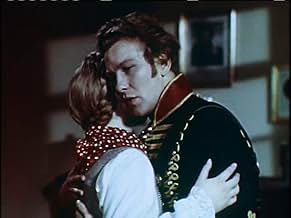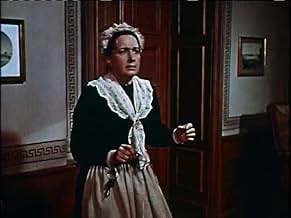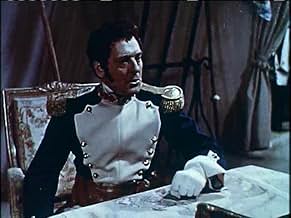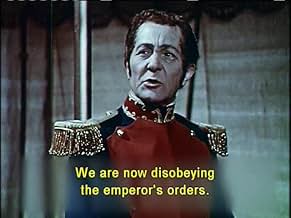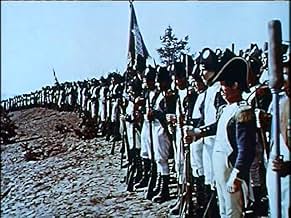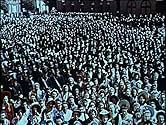Durant la campagne de Napoléon en Allemagne, Kolberg est coupée des forces prussiennes en retraite. La population refuse de capituler et organise la résistance contre l'armée française, qui ... Tout lireDurant la campagne de Napoléon en Allemagne, Kolberg est coupée des forces prussiennes en retraite. La population refuse de capituler et organise la résistance contre l'armée française, qui s'abat sur la ville en la bombardant massivement.Durant la campagne de Napoléon en Allemagne, Kolberg est coupée des forces prussiennes en retraite. La population refuse de capituler et organise la résistance contre l'armée française, qui s'abat sur la ville en la bombardant massivement.
- Réalisation
- Scénario
- Casting principal
- Zaufke
- (as H.H. Schaufuss)
- Fanselow
- (as F. Schafheitlin)
- französischer Offizier
- (as St. Germain)
Avis à la une
Herr Goebbels mentioned that "Kolberg" was an attempt to one-up the Hollywood style and clearly, he's given his director, Veit Harlan, the financial and manpower resources to stage some big scenes. Or, at least, what I think were big scenes. Goebbels, worried that the sight of Prussian troops (the film is set during the Napoleonic wars) getting wounded and killed in battle might demoralize the flagging German spirits - the film was shot in 1944 - and thus cut most action sequences out of the film. You'll get an army charging a hill abruptly cut into a shot of a burning house(whose ignition is never seen) cut again into someone encouraging the dedicated Prussian citizenry to hold fast against the merciless French troops. Cut back to a charging army that never really engages with the enemy. Cut again to panicking villagers. In between these gaps, which become more egregious as the film progresses, you get hamfisted attempts at colorful local humor, an impossibly convulted plot that crosscuts between several German towns to no avail, and an overbearing Valkyrie peasant woman forever spurring her fellow subjects to the Higher Cause (she's the most sexless woman in movie history). Everything in the movie is impossibly crude to the hammer-on-anvil dialouge, to the declarative acting (each actor seems to be wearing his or her own Greek mask while at the same time failing to make any impression whatsoever), to the whole stilted and incoherent pacing of this film.
The film is terrible but fascinating, especially given the context of when and where it was made. Goebbels diverted troops from the eastern front for the battle scenes that he subsequently mutiliated. And when one learns that Goebbels considered this the film that would revive the Nazi cause and that it was filmed at the time and near the locations where the Final Solution was shifting into high gear, it leaves you with a strong feeling of disgust for the whole enterprise. Even the subject matter, about Kolberg's citizens futilely defending themselves against a French onslaught, seems out of place. The tale is obviously used to rally support for the flailing German cause but the Kolberg citizenry's efforts were lost (the Prussian army was vanquished) and thus the message of the film is cancelled out. In an even greater historical irony, by the time the film debuted (30 January 1945), the Pomeranian town of Kolberg had been taken over by the Russians and today is a part of Poland.
"Kolberg" is a unique document showing a well-oiled propaganda machine collapsing in the face of its immanent demise. It achieves the opposite of its intent. The stolid face at the end of the film with the proto-Nazi flag as a backdrop is supposed to convey a sense of determined conviction but there's fear in those eyes.
The film is set during the Napoleonic Wars--back around 1807. Town after Prussian town have surrendered to the oncoming French juggernaut. Yet, inexplicably, the town of Kolberg isn't ready to welcome the invaders. Despite a very weak commander of the Prussian army in the region, the Mayor isn't about to surrender and he's encouraging his people to fight to the death, as by slowing down the enemy, ultimate victory may result. But, he must contend with the wimpy commander and send a rather ordinary lady on a mission to have the King replace the commander and support the defense of the city. What follows are some exceptional battle scenes and the only ones which I have seen which are better are from the insanely large Russian version of "War and Peace" (a film you just have to see at least once in your life).
Overall, the film is very rousing and inspiring. It's obvious that the purpose of the film is to get the German people to be very willing to lay down their lives as well as convince them that this is not a sacrifice in vain (which is was). As a result, the film probably contributed to the unnecessary deaths of thousands of people--when there was no possible way to stop the inevitable. Plus, unlike the Prussians during the time of Napoleon, they were NOT fighting for what was right. Sad...but amazingly effective...provided the local movie houses had not been blown up so the folks could see it in the first place! By the way, the scene where the peasant girl meets the queen was exceptionally well done--even brilliant. See this and you'll understand what I mean.
Goebbels film studios managed to film and distribute this movie just as the final battles of World War II were being fought. Its message of defiant defense in the face of hopeless odds was meant to rally the severely demoralised Germans as their homes were being threatened by the enemy. The songs and vivid colours were meant to entertain and raise morale as life became darker and darker.
Technically, its a masterpiece, and makes use of all kinds of modern shots, angles, and special effects. Its colours were terrible, though, but I trust it was the copy I saw. Of course, it might have been a result of the war constraints.
Seen in this context, this film is even more interesting than the entertaining story it presents.
Jurched
Le saviez-vous
- AnecdotesFeatured 15,000 to 20,000 actual German troops in the battle scenes, even as Germany's eastern and western fronts were collapsing. The director tried to make the shooting longer to save them from being sent to the front.
- GaffesSaxony didn't separate itself from the Holy Roman Empire. It was separated after the Rheinbund was founded in 1806, to which Saxony was included later. Also, in the movie the inclusion of Saxony is mentioned by King Franz II. In real life it didn't happen until December, almost four months after Franz's resignation.
- Citations
Bürgermeister Nettelbeck: [after Gneisenau asks Nettelbeck to surrender] You weren't born in Kolberg, Gneisenau. You are put here to Kolberg. But we grew up here. We know every stone, every corner every house here. We don't let go. Even if we have to claw in the ground of our city with our nails, we don't let go. First they have to cut off each of our hands or kill us one after the other. Gneisenau, you can't put the whole disgrace on an old man like me. and to give our city to Napoleon. I even promised our king: rather be buried below the ruins that capitulate. Gneisenau, Gneisenau, I never stand on my knees for anyone, now i'm doing it: Kolberg can't be given up, Gneisenau!
Gen. Gneisenau: That's what I wanted to hear from you, Nettelbeck. Now we can die together.
- ConnexionsEdited into Der 30. Januar 1945 (1965)
- Bandes originalesEin Volk steht auf
Meilleurs choix
- How long is Burning Hearts?Alimenté par Alexa
Détails
Box-office
- Budget
- 8 800 000 DEM (estimé)
- Durée1 heure 51 minutes
- Mixage
- Rapport de forme
- 1.37 : 1
Contribuer à cette page


